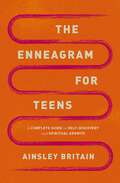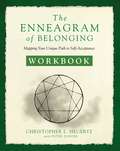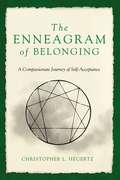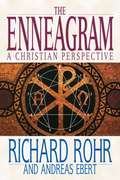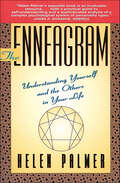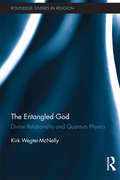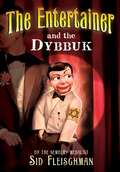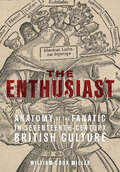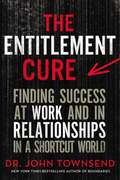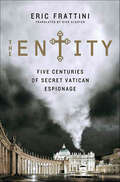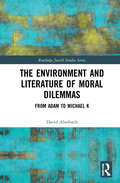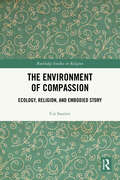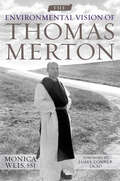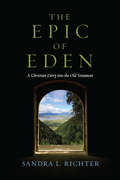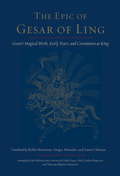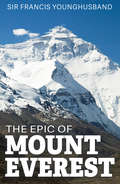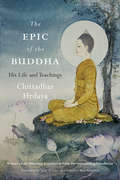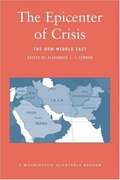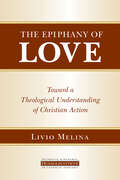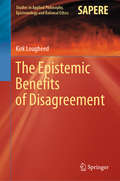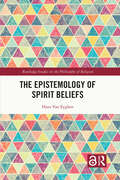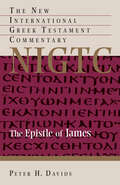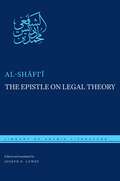- Table View
- List View
The Enneagram for Teens: A Complete Guide to Self-Discovery and Spiritual Growth
by Ainsley BritainFrom author and Enneagram coach Ainsley Britain comes a fun and informative introduction to the Enneagram personality test, specially crafted for teens and young adults. In The Enneagram for Teens, readers will discover their type and gain valuable insights into their relationships, faith, future selves, and more.As one of the most popular personality-typing systems, the Enneagram has been helping people gain a deeper understanding of themselves and others for decades. In The Enneagram for Teens, Ainsley Britain shares her vast knowledge of the Enneagram in an approachable, easy-to-use guide that&’s perfect for beginners. Filled with insights and tips on determining your type and navigating stress, relationships, faith, friendships, and more, The?Enneagram for Teens is an invaluable resource for finding your path and becoming the best version of yourself.The Enneagram for Teens features:An in-depth introduction to each of the nine typesInsights on how to use the Enneagram to better understand yourself and your relationships, as well as ideas on future careers that could fit your typeAdvice on how to grow emotionally and spiritually and promote your mental well-beingBonus materials, including ways to use the Enneagram in your day-to-day life?The Enneagram for Teens is perfect for:Young adults who are new to the Enneagram or want to learn moreChristian readers who love personality tests and self-discoveryParents, youth pastors, and student ministries looking for Enneagram resources
The Enneagram of Belonging Workbook: Mapping Your Unique Path to Self-Acceptance
by Christopher L. HeuertzImagine who you might become if you could make peace with the whole of who you are, rather than over-identifying with the "best" of your type or rejecting the "worst" of its expressions.If self-awareness is the first step of the journey, self-acceptance is the next, and practicing compassion toward oneself becomes essential. In this interactive companion to The Enneagram of Belonging, Enneagram teacher and bestselling author Chris Heuertz offers a fresh take on the Enneagram of Personality toward true transformation.Through guided space for self-reflection, practical prompts, and illuminating insights, The Enneagram of Belonging Workbook will help you:Break free from the stereotypes and surface treatment of your type toward a deeper understanding of identityUnderstand how your "Kidlife Crisis" has shaped your personality structureMake peace with the whole of who you are through radical self-acceptanceConfront your "inner dragons" gently, with compassion, toward lasting changeChart your personalized path back to belonging, as you come home to your true self
The Enneagram of Belonging: A Compassionate Journey of Self-Acceptance
by Christopher L. HeuertzFor the Enneagram enthusiast looking to deepen their transformation, The Enneagram of Belonging offers an enlightening, enriching path forward. eBook EXCLUSIVE: 45+ COLOR illustrations to provide greater depth of understanding. Many have discovered the Enneagram to be a powerful tool for self-understanding, yet knowing ourselves doesn't necessarily mean we accept ourselves. Most of us tend to curate the personality of our type: leading with the traits we perceive as positive and sidelining the traits that cause us shame. But what if it all belonged? Rather than furthering our own fragmentation, what if we dared to make peace with the whole of who we are with bold compassion? The Enneagram of Belonging is your guide to this essential journey.While most contemporary Enneagram books stop at the descriptions of the nine types, Enneagram teacher and The Sacred Enneagram bestselling author Chris Heuertz uncovers the missing link in our journey of living into our true self: radical self-compassion that can bring us back to belonging.Rather than get stuck on stereotypes or curated personality, Heuertz proposes we develop an honest relationship with our type, confronting our "inner dragons," practicing self-compassion, and thereby coming to fully belong to ourselves--and, ultimately, to love itself.In this in-depth examination of the Enneagram of Personality, you will discover:A fresh, compassionate way of understanding your childhood wound, which Heuertz reframes as your Kidlife CrisisYour unique subtype and how this colors your dominant type, plus how to work with your Enneagram instinctPractical insight to help you find freedom from your type's Passions and FixationsYour personalized path back to belonging, as you come home to your true self. . . and much more.As a masterful mapmaker and trailblazer of grace, Heuertz casts a vision for how we can create a better world. The truth is how we treat ourselves is how we treat others, so let's start with compassion, and let this outflow into our relationships, communities, and world.
The Enneagram: A Christian Perspective
by Richard Rohr Andreas EbertRichard Rohr and Andrea Ebert's runaway best-seller shows both the basic logic of the Enneagram and its harmony with the core truths of Christian thought from the time of the early Church forward.
The Enneagram: Understanding Yourself and the Others in Your Life
by Helen PalmerIt would be impossible for most of us to spend a day without coming into direct or indirect contact with dozens of people family, friends, people in the street, at the office, on television, in our fantasies and fears. Our relationships with others are the most changeable, infuriating, pleasurable and mystifying elements in our lives. Personality types, based on the ancient system of the Enneagram, will help you to enjoy more satisfying and fulfilling relationships in all areas of your life by introducing you to the nine basic personality types inherent in human nature. This knowledge will help you better understand how others think and why they behave as they do, as well as increasing your awareness of your own individual personality. Written by the leading world authority on the Enneagram, it offers a framework for understanding ourselves and those around us, as well as a wealth of practical insights for anyone interested in psychology, counselling, teaching, social work, journalism and personal management.
The Entangled God: Divine Relationality and Quantum Physics (Routledge Studies in Religion)
by Kirk Wegter-McNellyIn The Entangled God, Kirk Wegter-McNelly addresses the age-old theological question of how God is present to the world by constructing a novel, scientifically informed account of the God–world relation. Drawing on recent scientific and philosophical work in "quantum entanglement," Wegter-McNelly develops the metaphor of "divine entanglement" to ground the relationality and freedom of physical process in the power of God’s relational being. The Entangled God makes a three-fold contribution to contemporary theological and religious discourse. First, it calls attention to the convergence of recent theology around the idea of "relationality." Second, it introduces theological and religious readers to the fascinating story of quantum entanglement. Third, it offers a robust "plerotic" alternative to kenotic accounts of God’s suffering presence in the world. Above all, this book takes us beyond the view of theology and science as adversaries and demonstrates the value of constructively relating these two important areas of intellectual investigation.
The Entertainer and the Dybbuk
by Sid FleischmanOne night The Great Freddie, a young ventriloquist, is possessed by a dybbuk. A what? A Jewish spirit. A scrappy demon who glows as if spray-painted by moonlight. The dybbuk is revealed to be the ghost of a twelve-year-old boy named Avrom Amos, a victim of the Nazis during World War II. In a plucky scheme to seek revenge, he commandeers The Great Freddie's stage act and entraps the entertainer in the postwar ashes of Germany. Behind the footlights, the dybbuk lights up the terrible fate of a million and a half Jewish children, including Avrom himself. What tricks does the dybbuk have up his ghostly sleeve? Prepare to be astonished. . . .
The Enthusiast: Anatomy of the Fanatic in Seventeenth-Century British Culture
by William Cook MillerThe Enthusiast tells the story of a character type that was developed in early modern Britain to discredit radical prophets during an era that witnessed the dismantling of the Church of England's traditional means for punishing heresy. As William Cook Miller shows, the caricature of fanaticism here called the Enthusiast began as propaganda against religious dissenters, especially working-class upstarts, but was adopted by a range of writers as a literary vehicle for exploring profound problems of spirit, soul, and body and as a persona for the ironic expression of their own prophetic illuminations. Taking shape through the public and private writings of some of the most insightful authors of seventeenth-century Britain—Henry More, John Locke, the Third Earl of Shaftesbury, Mary Astell, and Jonathan Swift, among others—the Enthusiast appeared in various guises and literary modes. By attending to this literary being and its animators, The Enthusiast establishes the figure of the fanatic as a bridge between the Reformation and the Enlightenment, showing how an incipient secular modernity was informed by not the rejection of religion but the transformation of the prophet into something sparkling, witty, ironic, and new.
The Enthusiast: How the Best Friend of Francis of Assisi Almost Destroyed What He Started: The Untold Story of Elias of Cortona
by John M. SweeneyPopular historian and award-winning author relates the untold story of St. Francis of Assisi's friendship with Elias of Cortona, the man who helped him build the Franciscan movement. Sweeney uses the complexities of their relationship in a gripping manner, showing how their efforts changed the world and how Elias's enthusiasm betrayed the ideals of his friend.
The Entitlement Cure: Finding Success in Doing Hard Things the Right Way
by John TownsendToday we live in a culture that says, “Life should be easy and work well.” This attitude, called entitlement, influences our most important institutions: family, business, church, and government. Its devastating effects contribute to relational problems, work ethic issues, and emotional struggles.It comes down to this: People are not getting to where they want to go, because they don’t know how to do life the hard way. Entitlement keeps them from tackling challenges and finding success.But whether readers are struggling with their own sense of entitlement or dealing with someone who acts entitled, The Entitlement Cure will equip them to turn away from a life of mediocrity to a life of engagement, satisfaction, and joy.Drawing from his experience as a counselor and leadership consultant, renowned psychologist and New York Times bestselling author Dr. John Townsend explores strategies for fighting entitlement, such as:Take a meaningful risk every weekFind ways to minimize regretGrasp the value of keeping inconvenient commitmentsUnderstand why saying “I don’t know” is the first step toward success.In a culture that encourages shortcuts and irresponsibility, The Entitlement Cure provides principles and skills to help you both navigate life with those around you who have an entitlement mindset and identify areas in your own life where you are stuck in “easy way” living. Dr. Townsend will show you how to become successful, resolve obstacles in life, and help those around you.Ultimately, The Entitlement Cure provides practical tools for a life of success that works for anyone.
The Entity: Five Centuries of Secret Vatican Espionage
by Eric FrattiniThe International Bestseller"A true story that surpasses any novel by John le Carré."—El País (Spain)For five centuries, the Vatican—the oldest organization in the world, maker of kings and shaper of history—has used a secret spy service, called the Holy Alliance, or later, the Entity, to carry out its will. Forty popes have relied on it to carry out their policies. They have played a hitherto invisible role confronting de-Christianizations and schisms, revolutions and dictators, colonizations and expulsions, persecutions and attacks, civil wars and world wars, assassinations and kidnappings.For the first time in English (following the bestselling Spanish and French editions), Eric Frattini tells the comprehensive tale of this sacred secret service. The Entity has been involved in the killings of monarchs, poisonings of diplomats, financing of South American dictators, protection of war criminals, laundering of Mafia money, manipulation of financial markets, provocation of bank failures, and financing of arms sales to combatants even as their wars were condemned, all in the name of God. The contradiction between God's justice and Earth's justice, Christian beliefs and Christian power all fall before the motto of the Entity: With the Cross and the Sword.
The Environment and Literature of Moral Dilemmas: From Adam to Michael K (Routledge Jewish Studies Series)
by David AberbachExploring the literature of environmental moral dilemmas from the Hebrew Bible to modern times, this book argues the necessity of cross-disciplinary approaches to environmental studies, as a subject affecting everyone, in every aspect of life. Moral dilemmas are central in the literary genre of protest against the effects of industry, particularly in Romantic literature and ‘Condition of England’ novels. Writers from the time of the Industrial Revolution to the present—including William Blake, Elizabeth Gaskell, Charles Dickens, Émile Zola, Henrik Ibsen, Anton Chekhov, T.S. Eliot, John Steinbeck, George Orwell, and J.M. Coetzee—follow the Bible in seeing environmental problems in moral terms, as a consequence of human agency. The issues raised by these and other writers—including damage to the environment and its effects on health and quality of life, particularly on the poor; economic conflicts of interest; water and air pollution, deforestation, and the environmental effects of war—are fundamentally the same today, making their works a continual source of interest and insight. Sketching a brief literary history on the impact of human behavior on the environment, this volume will be of interest to readers researching environmental studies, literary studies, religious studies and international development, as well as a useful resource to scientists and readers of the Arts.
The Environment of Compassion: Ecology, Religion, and Embodied Story (Routledge Studies in Religion)
by Cia SautterThe Environment of Compassion explores questions of what it means to be in relationship to nature, if and how it is a religious experience, and how understanding humans as part of nature alters theology. The book offers a performance perspective that looks at ritual, dance, and theatre as a means of presenting discussion of sacred values in the public realm. The premise is that performance may serve as an effective means for developing human sacred values that recognize the more-than-human world, as it increases intersubjective awareness to address issues of social and environmental justice. The author investigates religion and theatre as a means of better understanding how eco-consciousness requires an aesthetic of the sacred. Rather than separate religion, culture, and nature, the book presents an aesthetic looking at the relationship between them. It considers how an embodied theatrical story might develop an inclusive community of compassion. Weaving the chapters together is an account of The Garden: A Refuge, an eco-centered play based on the biblical book of Job. Ecotheology, aesthetics, and embodiment theories are examined throughout, with scholarship and examples drawn largely from the Jewish tradition. The book is relevant to scholars of religion and theology, particularly those with an interest in the environment, as well as theatre, dance, and performance studies.
The Environmental Vision of Thomas Merton (Culture Of The Land Ser.)
by Monica Weis“Delightful . . . a superb guide to the ecological themes of Merton’s life and writings.” ?The Christian CenturyNature was always vital in Thomas Merton’s life, from the long hours he spent as a child watching his father paint landscapes in the fresh air, to his final years of solitude in the hermitage at Our Lady of Gethsemani, where he contemplated and wrote about the beauty of his surroundings. Throughout his life, Merton’s study of the natural world shaped his spirituality in profound ways, and he was one of the first writers to raise concern about ecological issues that have become critical in recent years.In The Environmental Vision of Thomas Merton, Monica Weis suggests that Merton’s interest in nature, which developed significantly during his years at the Abbey of Gethsemani, laid the foundation for his growing environmental consciousness. Tracing Merton’s awareness of the natural world from his childhood to the final years of his life, Weis explores his deepening sense of place and desire for solitude, his love and responsibility for all living things, and his evolving ecological awareness.“Explains how Merton evolved from a nature enthusiast . . . to one of the world’s most respected ecological stewards.” ?Louisville Courier Journal
The Epic of Eden: A Christian Entry into the Old Testament
by Sandra L. RichterDoes your knowledge of the Old Testament feel like a grab bag of people, books, events and ideas? How many times have you resolved to really understand the OT? To finally make sense of it? Perhaps you are suffering from what Sandra Richter calls the "dysfunctional closet syndrome." If so, she has a solution. Like a home-organizing expert, she comes in and helps you straighten up your cluttered closet. Gives you hangers for facts. A timeline to put them on. And handy containers for the clutter on the floor. Plus she fills out your wardrobe of knowledge with exciting new facts and new perspectives. The whole thing is put in usable order--a history of God's redeeming grace. A story that runs from the Eden of the Garden to the garden of the New Jerusalem. Whether you are a frustrated do-it-yourselfer or a beginning student enrolled in a course, this book will organize your understanding of the Old Testament and renew your enthusiasm for studying the Bible as a whole.
The Epic of Gesar of Ling: Gesar's Magical Birth, Early Years, and Coronation as King
by Sakyong Mipham Sangye Khandro Lama Chonam Alak Zenkar Rinpoche Robin KornmanThe epic of Gesar has been the national treasure of Tibet for almost a thousand years. An open canon of tales about a superhuman warrior-king, the epic is still a living oral tradition, included on UNESCO's Representative List of the Intangible Cultural Heritage of Humanity. This book is a translation of the beginning portion of this enormous corpus, covering all the events from Gesar's divine conception to his human birth and mischievous childhood to his coronation as king of Ling.Born in the pure lands the son of two wisdom deities, Gesar takes rebirth in the human realm in order to defeat the demon kings who had taken over the empires of Asia and to thus liberate the people from suffering. His jealous uncle Trothung proves to be the first major threat to this goal, but Gesar outwits him every time using magic. In the last chapters of the book, he and Trothung's son face off in a high-tension horse race to decide who will win the throne of Ling and the hand of the coveted Princess Drugmo in marriage.Gesar's story is popularly read as an allegory, with Gesar representing the ideal of spiritual warriorship--that is, fearlessness in the face of obstacles on the path to enlightenment. Just as Gesar rides his flying steed, we too can ride the energy of dignity, confidence, and power that is inherent to us, subduing inner demons and claiming victory.
The Epic of Mount Everest: The Historic Account Of Mallory's Expeditions
by Sir Francis YounghusbandThe Epic of Mount Everest, first published in 1926, is the exciting story of the first attempts to reach the summit of Mount Everest, including that of George Mallory and Andrew Irvine, who disappeared and died in the 1924 expedition. Considered “must reading” for mountaineers, The Epic of Mount Everest provides a fascinating insight into the men, methods, and struggles of early mountain-climbers. Included are 15 pages of illustrations and 2 maps.
The Epic of the Buddha: His Life and Teachings (Harvard Oriental Ser. #67)
by Chittadhar HrdayaA translation of the modern Nepalese classic Winner of the Toshihide Numata Book Award in Buddhism and the Khyentse Foundation Prize for Outstanding Translation This award-winning book contains the English translation of Sugata Saurabha (“The Sweet Fragrance of the Buddha”), an epic poem on the life and teachings of the Buddha. Chittadhar Hṛdaya, a master poet from Nepal, wrote this tour de force while imprisoned for subversion in the 1940s and smuggled it out over time on scraps of paper. His consummate skill and poetic artistry are evident throughout as he tells the Buddha’s story in dramatic terms, drawing on images from the natural world to heighten the description of emotionally charged events. It is peopled with very human characters who experience a wide range of emotions, from erotic love to anger, jealousy, heroism, compassion, and goodwill. By showing how the central events of the Buddha’s life are experienced by Siddhartha, as well as by his family members and various disciples, the poem communicates a fuller sense of the humanity of everyone involved and the depth and power of the Buddha’s loving-kindness. For this new edition of the English translation, the translators improved the beauty and flow of most every line. The translation is also supplemented with a series of short essays by Todd Lewis, one of the translators, that articulates how Hṛdaya incorporated his own Newar cultural traditions in order to connect his readership with the immediacy and relevancy of the Buddha’s life and at the same time express his views on political issues, ethical principles, literary life, gender discrimination, economic policy, and social reform.
The Epicenter of Crisis: The New Middle East
by Alexander T. J. LennonThe Epicenter of Crisis argues that six contiguous states epitomize the security challenges of a post-9/11, globalized world: Saudi Arabia, Syria, Iraq, Iran, Afghanistan, and Pakistan.
The Epiphany of Love: Toward a Theological Understanding of Christian Action (Ressourcement: Retrieval and Renewal in Catholic Thought (RRRCT))
by Livio MelinaIn this volume Livio Melina attempts to overcome the deadlock in which moral theology can easily find itself due to the false alternative between moralism, with its emphasis on external rules, and antimoralism, with its insistence on freedom from all norms. The key, Melina argues here, is not to regard morality as a simple list of principles directing our choices and helping us to make correct moral judgments. Rather, we must step back and begin to comprehend the dynamic mystery of Christian action. Only in the light of Christ can the proper correlation between faith and morality, freedom and truth, be clearly understood. True morality springs from a synergistic relationship with God, born of faith in Christ, nurtured in the church, and made manifest in that which inspires all authentic goodness -- the epiphany of love.
The Epistemic Benefits of Disagreement (Studies in Applied Philosophy, Epistemology and Rational Ethics #51)
by Kirk LougheedThis book presents an original discussion and analysis of epistemic peer disagreement. It reviews a wide range of cases from the literature, and extends the definition of epistemic peerhood with respect to the current one, to account for the actual variability found in real-world examples. The book offers a number of arguments supporting the variability in the nature and in the range of disagreements, and outlines the main benefits of disagreement among peers i.e. what the author calls the benefits to inquiry argument.
The Epistemology of Spirit Beliefs (Routledge Studies in the Philosophy of Religion)
by Hans Van EyghenThis book assesses whether belief in spirits is epistemically justified. It presents two arguments in support of the existence of spirits and arguments that experiences of various sorts (perceptions, mediumship, possession and animistic experiences) can lend justification to spirit-beliefs. Most work in philosophy of religion exclusively deals with the existence of God or the epistemic status of belief in God. Spirit beliefs are often regarded as aberrations, and the falsity of such beliefs is often assumed. This book argues that various beliefs concerning spirits can be regarded as justified when they are rooted in experiences that are not defeated. It argues that spirit-beliefs are not defeated by recent theories put forth by neuroscientists, cognitive scientists or evolutionary biologists. Additional arguments are made that traditional theistic belief is epistemically linked to spirit beliefs and that unusual events can be explained in terms of spirit-activity. The book draws on theistic arguments, phenomenal conservatism and defenses of religious experiences to argue for the justification of spirit-beliefs. The arguments draw on examples from various religious traditions ranging from Christianity and Islam to Haitian Vodou and Tibetan Bon. The Epistemology of Spirit Beliefs will be of interest to researchers and advanced students working in philosophy of religion, religious epistemology, ethnography and cognitive neuroscience.
The Epistemology of Spirit Beliefs (Routledge Studies in the Philosophy of Religion)
by Hans Van EyghenThis book assesses whether belief in spirits is epistemically justified. It presents two arguments in support of the existence of spirits and arguments that experiences of various sorts (perceptions, mediumship, possession and animistic experiences) can lend justification to spirit-beliefs.Most work in philosophy of religion exclusively deals with the existence of God or the epistemic status of belief in God. Spirit beliefs are often regarded as aberrations, and the falsity of such beliefs is often assumed. This book argues that various beliefs concerning spirits can be regarded as justified when they are rooted in experiences that are not defeated. It argues that spirit-beliefs are not defeated by recent theories put forth by neuroscientists, cognitive scientists or evolutionary biologists. Additional arguments are made that traditional theistic belief is epistemically linked to spirit beliefs and that unusual events can be explained in terms of spirit-activity. The book draws on theistic arguments, phenomenal conservatism and defenses of religious experiences to argue for the justification of spirit-beliefs. The arguments draw on examples from various religious traditions ranging from Christianity and Islam to Haitian Vodou and Tibetan Bon.The Epistemology of Spirit Beliefs will be of interest to researchers and advanced students working in philosophy of religion, religious epistemology, ethnography and cognitive neuroscience.The Open Access version of this book, available at www.taylorfrancis.com, has been made available under a Creative Commons Attribution-NonCommercial (CC-BY-NC) 4.0 International license.
The Epistle of James (The New International Greek Testament Commentary)
by Peter H. DavidsPeter David's study on the Epistle of James is a contribution to The New International Greek Testament Commentary, a series based on the UBS Greek New Testament, which attempts to provide thorough exegesis of the text that is sensitive to theological themes as well as to the details of the historical, linguistic, and textual context.
The Epistle on Legal Theory: A Translation Of Al-shafii's Risalah (Library of Arabic Literature #48)
by Muhammad ibn al-Shafi'iA modern translation of a foundational document of Islamic jurisprudenceThe Epistle on Legal Theory is the oldest surviving Arabic work on Islamic legal theory and the foundational document of Islamic jurisprudence. Its author, Muhammad ibn Idris al-Shafi'i (d. 204/820), was the eponym of the Shafi'i school of legal thought, one of the four rites in Sunni Islam. This fascinating work offers the first systematic treatment in Arabic of key issues in Islamic legal thought. These include a survey of the importance of Arabic as the language of revelation, principles of textual interpretation to be applied to the Qur'an and prophetic Traditions, techniques for harmonizing apparently contradictory precedents, legal epistemology, rulesof inference, and discussions of when legal interpretation is required. The author illustrates his theoretical claims with numerous examples drawn from nearly all areas of Islamic law, including ritual law, commercial law, tort law, and criminal law. The text thus provides an important window into both Islamic law and legal thought in particular and early Islamic intellectual history in general.The Arabic text has been established on the basis of the two most important critical editions and includes variants in the notes, while the English text is a new translation by a leading scholar of Shafi'i and his thought. The Epistle on Legal Theory represents one of the earliest complete works on Islamic law, one that is centrally important for the formation of Islamic legal thought and the Islamic legal tradition.A bilingual Arabic-English edition.
